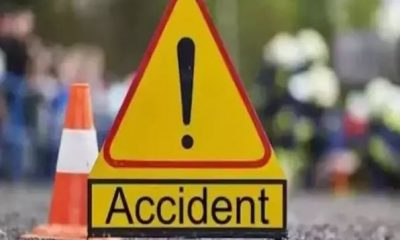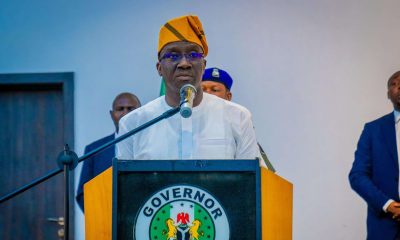BRIBERY is a ‘product of fear of the unknown’, Police boss Arase says
The Inspector General of Police, Mr Solomon Arase, says the issue of bribery in the Nigeria Police Force is a product of the fear of the unknown, but something Nigerians should use the provided platforms to eradicate.
Mr Arase told Channels Television on Monday that the issue of bribery had reduced drastically since platforms were put in place to take reports of bribery from the public.
“I have done everything I should do as an Inspector General of Police to open up the Nigeria Police Fore to public accountability. I have set up platforms and I expect Nigerians to use those platforms.
“It is left for Nigerians to say no you can’t do that.
“I have set up the Crime Response Unit and it is the first you have in Africa. I have insisted that there must be a feedback. There must be a response to cases reported to the police through the platform.
“I cannot be everywhere,” he stressed.
The police boss explained that he had established a strategic approach to tackle the issue of bribery.
“I do things that will guarantee their welfare. The Inspectors and rank and file are the most neglected in the Nigeria Police Force and they are the ones you see on the street.
“It (the welfare plan) has been well thought out and I deliberately targeted those groups of people that are creating negative impressions about us. We have not been able to take a look at these group of officers that we can now have the moral attitude to go against them whenever they engage in unprofessional conduct,” he said.
One of the provisions that he had made was the provision of apartments for the officers and scholarship scheme for their children through a foundation.
Deploying officers to Agatu unbudgeted for
On the crisis in Agatu between herdsmen and farmers in the community, he said police officers had been deployed to the place but lamented that such provision was not budgeted for and was expensive for the police to handle.
He said: “The communal crisis in Agatu is not new to our system but the magnitude is the issue. It has been reinforced by people who came into our system.
“We have to be able to situate them into historical perspectives.
“I have suggested to Nasarawa and Benue States Governors that the crisis are seasonal outburst. We can already identify the boundaries where it happens. Is it not possible to have a buffer zone? We can secure that place permanently but there is a cost implication.
“The buffer zone will become a force to contend with before access would be gained into the other side”.
He further stated that some policemen had been deployed in Agatu, but also said that the cost implication of deploying men to a troubled spot in a particular point in time was usually unbudgeted for.
“If I deploy them and their welfare is not appropriately taken care of then I am creating another problem.
“It will get to a time that the men will start agitating for better welfare and I will start looking for money to take care of their needs,” he explained.
There have been insinuations that the herdsmen could be members of the Boko Haram that had been chased out of their safe haven by troops on counter-terrorism operations in the north-east.
But the police boss said there was nothing to suggest that they were Boko Haram in disguise.
“We have had an interface with the leadership of the herdsmen and the President and the Secretary had done a lot with the police.”
He further said that some herdsmen suspected to have carried out attacks on farmers had been arrested and were being prosecuted.
Proliferation of arms
Giving an insight into the crisis, Mr Arase stressed that pastoralists in Nigeria, historically, have been people who domicile within the nation, known for carrying dagger or bow and arrows.
“The series of wars that have happened within the African sub-region – from Libya, Tunisia, Mali – you will discover that there have been proliferation of arms.
“We have borders that we cannot man appropriately because they are numerous and we have an agreement with ECOWAS to be their friend and develop good neighbourliness. Some of the arms have found their way into Nigeria.
“The guns do not come in legally. They are smuggled. Immigration officers may oversight the guns which are usually slotted in their goods as part of their goods,” he said.
He further gave the police’s commitment to securing Nigerians lives and proper, saying that the force has continued to train its officials who are very vast in crime analysis.
According to him, the trained officials are sent to the states of the federation to give the commissioners of police the expertise to be able to gather information, analyse them and utilise them in internal security management.
Source: Channels TV

 Health1 week ago
Health1 week ago
 Latest1 week ago
Latest1 week ago
 Health7 days ago
Health7 days ago
 Football7 days ago
Football7 days ago
 News1 week ago
News1 week ago
 Latest1 week ago
Latest1 week ago
 News1 week ago
News1 week ago
 Latest1 week ago
Latest1 week ago

